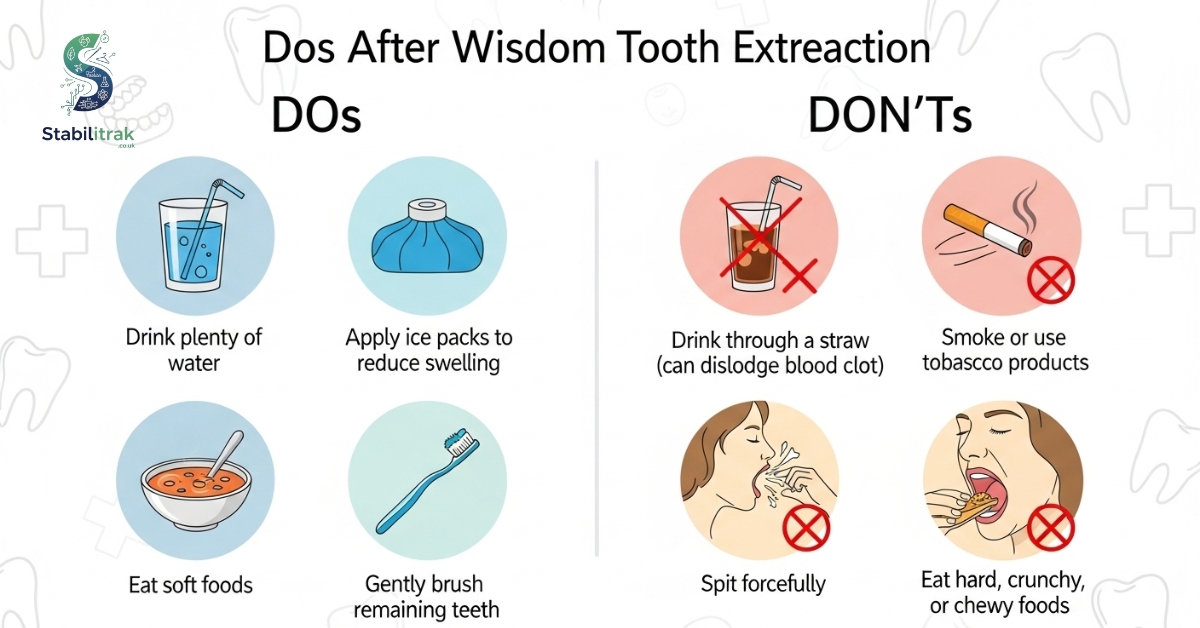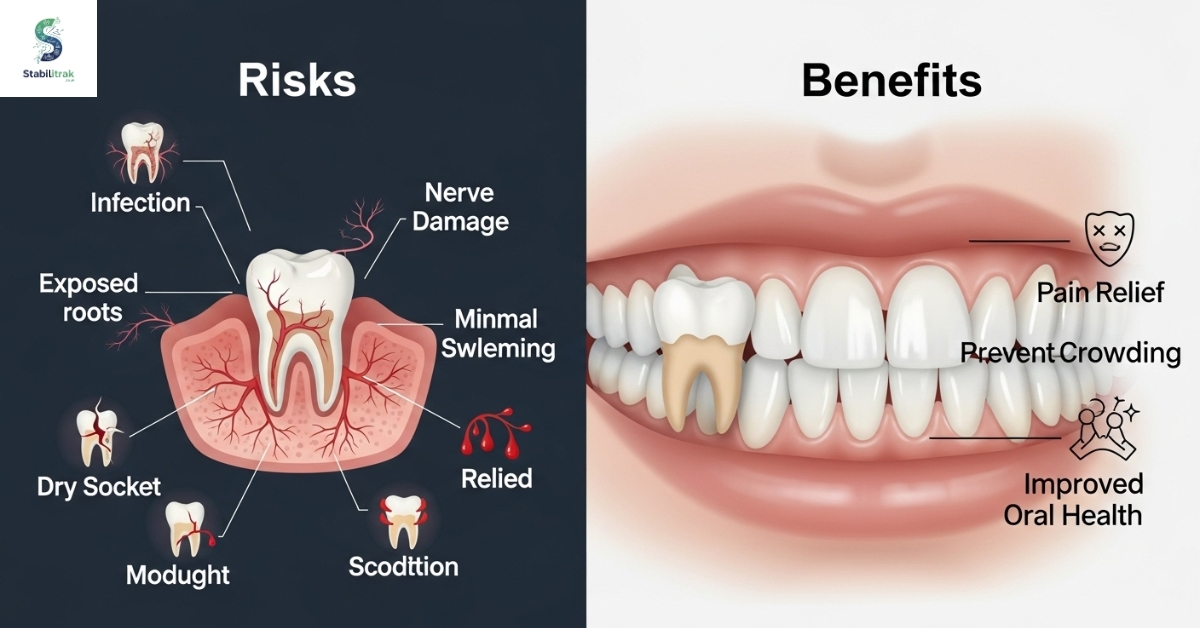If you’ve ever had trouble with your wisdom teeth, you know how uncomfortable and confusing it can feel. Maybe you’ve been dealing with soreness in the back of your mouth, or you’ve heard stories about painful extractions and long recovery times. It’s normal to feel a bit nervous and want clear answers before making any decisions.
In this blog, we’ll break down everything you need to know about wisdom teeth in simple terms. From how long the removal takes to what recovery is really like, you’ll get straightforward information to help you feel prepared and less stressed. By the end, you’ll know exactly what to expect and how to handle the process with confidence.
Why Do People Remove Their Wisdom Teeth?
Wisdom teeth, often called third molars, tend to emerge between ages 17 and 25. Some erupt without causing issues, but many people face problems like overcrowding, tooth decay, gum disease, or impacted teeth. Impacted wisdom teeth grow at odd angles or remain trapped under the gums, which can lead to pain, swelling, and infection.
Dentists often recommend extraction to prevent future oral health issues. For example, wisdom teeth that partially erupt can trap food and cause plaque buildup, increasing the risk of cavities or gum disease. In more complex cases, cyst formation or bone loss around the jaw can occur. Preventive removal helps you avoid these complications before they start.
Understanding Wisdom Tooth Removal
What is wisdom teeth removal?
Wisdom teeth removal is a common dental surgery where one or more third molars are extracted. It’s usually done as outpatient surgery, which means you go home the same day. The procedure can involve a simple extraction if the tooth is fully erupted, or a surgical extraction if it’s impacted beneath the gums or bone.
Why is this done?
Most people remove their wisdom teeth because there isn’t enough space in the jaw to accommodate them. Overcrowding can push other teeth out of alignment. Infections, gum irritation, or repeated toothaches are also common reasons. Even if your wisdom teeth don’t hurt now, many dentists recommend removing them early to prevent problems later, especially in young adults.
Preparing for the Procedure
Consultation and dental x-rays
Before extraction, your dentist or oral surgeon will perform an oral exam and take dental x-rays. These images show the position of the roots, the angle of eruption, and whether the teeth are impacted. This step helps your dental team decide the best approach, estimate surgery time, and choose anesthesia options.
What options may be discussed?
During consultation, anesthesia will be a big part of the discussion. You may choose between:
- Local anesthesia: Numbs only the extraction site. You’re awake but won’t feel pain.
- Nitrous oxide (laughing gas): Helps you relax during the procedure.
- Oral sedation: Taken in pill form before surgery to reduce anxiety.
- IV sedation: Given intravenously to help you relax more deeply.
- General anesthesia: You’re fully asleep, often used for complex cases or the removal of all four teeth at once.
The choice depends on the complexity of your case and your comfort level.
Read More Article: How Long Until a Tooth Infection Kills You?
What to Expect During the Procedure

What type of anesthesia is used?
Most people undergo either IV sedation or local anesthesia combined with nitrous oxide. General anesthesia is less common but may be used if multiple impacted wisdom teeth need removal. Your oral surgeon and anesthesia monitoring team will keep you safe throughout.
How long does the procedure take?
A straightforward wisdom tooth extraction can take as little as 20 minutes. More complex cases, like impacted wisdom teeth under the bone, may take closer to 40 to 60 minutes. If all four wisdom teeth are removed in one visit, expect the procedure to last about 45 minutes to an hour.
How long does it take to extract 4 wisdom teeth?
Removing all four wisdom teeth at once often takes about an hour, though recovery from anesthesia may add another 30 to 60 minutes before you can go home. Factors such as the angle of the teeth, the depth of the gums, and the presence of infection can make the surgery longer.
Aftercare and Recovery
Recovering from wisdom tooth removal
The healing process varies by person. Most people feel back to normal in about one to two weeks. The first 24–48 hours are when swelling, bleeding, and discomfort are most noticeable. Pain control often includes prescribed medication or over-the-counter pain relievers, along with ice pack therapy to manage swelling.
Worst day of pain after wisdom tooth extraction
Many patients report that day two or three is the most uncomfortable, since swelling peaks around this time. By the fourth day, symptoms usually start improving. Keeping gauze pressure on the extraction site, following dietary guidelines, and practicing good oral hygiene help reduce discomfort.
How long after wisdom teeth removal can I eat?
You can usually drink fluids right after surgery once the anesthesia wears off. Soft foods like yogurt, mashed potatoes, or smoothies are recommended for the first 24–48 hours. Avoid crunchy, spicy, or hot foods that may irritate the surgical wound.
What to eat after wisdom teeth removal
Stick to a soft diet in the first week. Good options include:
- Applesauce
- Oatmeal
- Scrambled eggs
- Soups and broths
- Smoothies (avoid straws to protect the blood clot)
Gradually reintroduce solid foods as the extraction site heals.
When can I go back to work or school?
Most people return within 2 to 3 days if their job isn’t physically demanding. For jobs that require strenuous exercise, heavy lifting, or long speaking hours, a full week off may be better to allow proper healing.
Read More Article: Why Does the Roof of My Mouth Hurt?
Dos and Don’ts After Wisdom Tooth Extraction

Do:
- Use an ice pack for the first 24 hours
- Rinse gently with warm salt water after meals.
- Follow post-surgery instructions from your dentist.
- Take medications as prescribed.
- Sleep with your head slightly elevated to reduce swelling.
Don’t:
- Use a straw (it can dislodge the blood clot)
- Smoke or drink alcohol
- Eat hard, crunchy, or sticky foods in the first week.
- Perform strenuous exercise within 72 hours.
Risks and Benefits

What are the benefits of removing wisdom teeth?
- Prevents overcrowding and misalignment
- Lowers the risk of cavities and gum disease
- Reduces the chance of infection from impacted teeth
- Eliminates recurring jaw pain and swelling
What are the risks or complications of extraction?
Like any surgery, complications are possible. Risks include:
- Dry socket (when the blood clot dislodges)
- Nerve damage leading to altered sensation
- Jaw stiffness or bruising
- Sinus complications with upper wisdom teeth
- Infection at the surgical wound
Choosing an experienced oral surgeon greatly reduces these risks.
When to Call the Doctor
When should I call my oral surgeon?
Contact your dental team if you notice:
- Persistent or severe bleeding beyond 24 hours
- Extreme swelling or worsening pain after day three
- Fever or signs of infection
- Pus at the extraction site
- Difficulty swallowing or breathing
Prompt treatment can prevent complications from escalating.
Additional Details
Do you have to get your wisdom teeth removed?
Not always. If your third molars erupt normally, don’t cause pain, and are easy to clean, your dentist may recommend keeping them under regular review.
What’s the average wisdom teeth removal age?
Most people get them removed between 17 and 25. Extraction is generally easier at this age because the roots are not fully developed and healing is quicker.
Is there much pain or swelling after removal?
Mild to moderate discomfort is normal, but modern anesthesia and pain control options make the process much easier. Swelling typically peaks on the second or third day and then gradually subsides.
Do I need time off work?
Yes, most patients take at least two days off. For more complex surgical cases, a stay of three to five days may be required.
Location-Specific Information
Get Your Wisdom Teeth Removed in Colorado Springs
If you’re in Colorado Springs, practices like Tuttle Family Dentistry offer sedation dentistry and personalized care plans for wisdom tooth extraction. An oral surgeon will guide you through consultation, anesthesia options, and recovery instructions tailored to your case.
A note from Cleveland Clinic
According to the Cleveland Clinic, wisdom tooth removal is one of the most common oral surgeries worldwide. They emphasize that preparation, post-operative care, and clear communication with your dental team are key to a smooth recovery.
Care at Cleveland Clinic
Cleveland Clinic offers outpatient dental surgery with experienced consultants in oral and maxillofacial surgery. Their guidance on post-operative care—like using antibacterial mouthwash, avoiding strenuous exercise, and following dietary guidelines—helps patients heal more comfortably.
Final Thoughts
So, how long does wisdom teeth removal take? The procedure itself can be as quick as 20 minutes for a single tooth or up to an hour for all four. But the full journey, including recovery, usually takes about one to two weeks. By following post-surgery instructions, eating the right foods, and contacting your oral surgeon if problems arise, you can make the healing process smoother and less stressful.
FAQs About Wisdom Teeth Removal
How much is wisdom teeth removal?
The cost varies widely depending on the number of teeth, anesthesia type, and location. On average, it ranges from $200 to $800 per tooth.
How long does wisdom tooth recovery take?
Most people recover within 1 to 2 weeks. Initial swelling and discomfort peak in the first 3 days, then gradually improve.
How long does it take to remove 4 wisdom teeth?
Removing all four usually takes about 45 minutes to an hour. Recovery adds another 30 to 60 minutes before you can go home.
How long does wisdom teeth removal take, Reddit?
Experiences vary, but most Reddit users report 20 to 40 minutes for simple extractions and closer to an hour for complex cases.
How long does wisdom teeth removal take without anesthesia?
Without sedation, using only local anesthesia, a single extraction can take about 20 to 30 minutes. Complex cases may take longer.
How soon can you talk after wisdom teeth removal?
You can usually speak right away, but it may feel uncomfortable due to numbness and gauze in your mouth.
How long does wisdom teeth removal pain last?
Mild to moderate pain usually lasts 2 to 4 days. Discomfort steadily improves after the third day.
How long does a 2 wisdom teeth removal take to heal?
Healing for two teeth typically takes 7 to 10 days, though full recovery can take up to 2 weeks.
How painful is wisdom teeth removal afterwards?
Most patients feel soreness and swelling for a few days. Pain is manageable with medication and proper aftercare.
Can I eat 5 hours after wisdom teeth removal?
It’s best to wait until bleeding has stopped and anesthesia wears off. Start with soft foods like yogurt or smoothies.
Is day 3 the worst of wisdom teeth removal?
Yes, day 3 is often the peak for swelling and discomfort. After that, symptoms usually begin to improve.







1 thought on “How Long Does Wisdom Teeth Removal Take? (Complete Guide)”